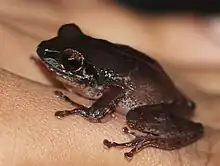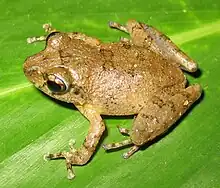Pseudophilautus
Pseudophilautus is a group of frogs in the family Rhacophoridae. Some of them live in India in the Western Ghat mountains and some live in Sri Lanka.[1] Some of these frogs are extinct.[2] Other times, scientists thought a species was extinct, but it was not.[3][4]

| Pseudophilautus | |
|---|---|
 | |
| Adult male Pseudophilautus rus from Hantane Range, Kandy | |
| Scientific classification | |
| Domain: | Eukaryota |
| Kingdom: | Animalia |
| Phylum: | Chordata |
| Class: | Amphibia |
| Order: | Anura |
| Family: | Rhacophoridae |
| Subfamily: | Rhacophorinae |
| Genus: | Pseudophilautus Laurent, 1943 |
| Species | |
|
See text | |
Life cycle
Frogs in genus Pseudophilautus have direct development: They hatch out of eggs as small frogs called froglets. They never swim as tadpoles the way other frogs do. This means that these frogs do not need to find pools of water big enough for tadpoles to swim in and find food. However, if there is not enough water in the air, the eggs dry out and die.[5]
For most of these species, the female frog lays eggs on the ground. One species, Pseudophilautus femoralis, lays eggs on leaves of medium-sized plants. Males sing for female frogs. They usually call at night when there is water in the air. The male frog holds onto the female frog in a grip called amplexus. Sometimes the frogs will change color so that they look like the ground or the leaves on it. Then the female frog finds a good place and digs a hole for the eggs. Then she mixes the eggs in with the soil. Then both parents go away. They do not watch the eggs or take care of the froglets. When the female Pseudophilautus femoralis frog lays eggs, she puts them on the undersides of leaves using sticky fluid. She watches the eggs for a few hours to see that they do not fall off. Then she goes away.[5]
Eggs are 3.7–5.7 mm (0.15–0.22 in) in diameter. The eggs hatch after 24–68 days. Pseudophilautus embryos do not have gills but they do have large tails like tadpoles do. Scientists think the embryos use the tail to get oxygen. Some species of froglets have tails when they hatch and in other species they hatch with no tail.[5]
List of species
The following species are in the genus Pseudophilautus,[1] including eight species described in 2013 by Wickramasinghe and colleagues:[6]
- Pseudophilautus abundus (Manamendra-Arachchi & Pethiyagoda, 2005)[7]
- Pseudophilautus adspersus† (Günther, 1872)
- Pseudophilautus alto (Manamendra-Arachchi & Pethiyagoda, 2005)[7]
- Pseudophilautus amboli (Biju and Bossuyt, 2009)
- Pseudophilautus asankai (Manamendra-Arachchi & Pethiyagoda, 2005)[7]
- Pseudophilautus auratus (Manamendra-Arachchi & Pethiyagoda, 2005)[7]
- Pseudophilautus bambaradeniyai Wickramasinghe et al., 2013[6]
- Pseudophilautus caeruleus (Manamendra-Arachchi & Pethiyagoda, 2005)[7]
- Pseudophilautus cavirostris (Günther, 1869)
- Pseudophilautus conniffae Batuwita, M. de Silva & Udugampala, 2019
- Pseudophilautus cuspis (Manamendra-Arachchi & Pethiyagoda, 2005)[7]
- Pseudophilautus dayawansai Wickramasinghe et al., 2013[6]
- Pseudophilautus decoris (Manamendra-Arachchi & Pethiyagoda, 2005)[7]
- Pseudophilautus dilmah (Wickramasinghe, Bandara, Vidanapathirana, Tennakoon, Samarakoon & Wickramasinghe, 2015)
- Pseudophilautus dimbullae† (Shreve, 1940)
- Pseudophilautus eximius† (Shreve, 1940)
- Pseudophilautus extirpo† (Manamendra-Arachchi & Pethiyagoda, 2005)[7]
- Pseudophilautus femoralis (Günther, 1864)
- Pseudophilautus fergusonianus (Ahl, 1927)
- Pseudophilautus folicola (Manamendra-Arachchi & Pethiyagoda, 2005)[7]
- Pseudophilautus frankenbergi (Meegaskumbura & Manamendra-Arachchi, 2005)[8]
- Pseudophilautus fulvus (Manamendra-Arachchi & Pethiyagoda, 2005)[7]
- Pseudophilautus hallidayi (Meegaskumbura & Manamendra-Arachchi, 2005)[8]
- Pseudophilautus halyi† (Boulenger, 1904)
- Pseudophilautus hankeni Meegaskumbura & Manamendra-Archchi, 2011[9]
- Pseudophilautus hoffmanni (Meegaskumbura & Manamendra-Arachchi, 2005)[8]
- Pseudophilautus hoipolloi (Manamendra-Arachchi & Pethiyagoda, 2005)[7]
- Pseudophilautus hypomelas (Günther, 1876)
- Pseudophilautus jagathgunawardanai Wickramasinghe et al., 2013[6]
- Pseudophilautus kani (Biju and Bossuyt, 2009)
- Pseudophilautus karunarathnai Wickramasinghe et al., 2013[6]
- Pseudophilautus leucorhinus† (Lichtenstein and Martens, 1856)
- Pseudophilautus limbus (Manamendra-Arachchi & Pethiyagoda, 2005)[7]
- Pseudophilautus lunatus (Manamendra-Arachchi & Pethiyagoda, 2005)[7]
- Pseudophilautus macropus (Günther, 1869)
- Pseudophilautus maia (Meegaskumbura et al., 2007)[10]
- Pseudophilautus malcolmsmithi (Ahl, 1927)
- Pseudophilautus microtympanum (Günther, 1858)
- Pseudophilautus mittermeieri (Meegaskumbura & Manamendra-Arachchi, 2005)[8]
- Pseudophilautus mooreorum (Meegaskumbura & Manamendra-Arachchi, 2005)[8]
- Pseudophilautus nanus† (Günther, 1869)
- Pseudophilautus nasutus† (Günther, 1869)
- Pseudophilautus nemus (Manamendra-Arachchi & Pethiyagoda, 2005)[7]
- Pseudophilautus newtonjayawardanei Wickramasinghe et al., 2013[6]
- Pseudophilautus ocularis (Manamendra-Arachchi & Pethiyagoda, 2005)[7]
- Pseudophilautus oxyrhynchus (Günther, 1872)
- Pseudophilautus papillosus (Manamendra-Arachchi & Pethiyagoda, 2005)[7]
- Pseudophilautus pardus (Meegaskumbura et al., 2007)[10]
- Pseudophilautus pleurotaenia (Boulenger, 1904)
- Pseudophilautus poppiae (Meegaskumbura & Manamendra-Arachchi, 2005)[8]
- Pseudophilautus popularis (Manamendra-Arachchi & Pethiyagoda, 2005)[7]
- Pseudophilautus procax (Manamendra-Arachchi & Pethiyagoda, 2005)[7]
- Pseudophilautus puranappu Wickramasinghe et al., 2013[6]
- Pseudophilautus regius (Manamendra-Arachchi & Pethiyagoda, 2005)[7]
- Pseudophilautus reticulatus (Günther, 1864)
- Pseudophilautus rugatus† (Ahl, 1927)
- Pseudophilautus rus (Manamendra-Arachchi & Pethiyagoda, 2005)[7]
- Pseudophilautus samarakoon Wickramasinghe et al., 2013[6]
- Pseudophilautus sarasinorum (Müller, 1887)
- Pseudophilautus schmarda (Kelaart, 1854)
- Pseudophilautus schneideri Meegaskumbura & Manamendra-Archchi, 2011[9]
- Pseudophilautus semiruber (Annandale, 1913)
- Pseudophilautus silus (Manamendra-Arachchi & Pethiyagoda, 2005)[7]
- Pseudophilautus silvaticus (Manamendra-Arachchi & Pethiyagoda, 2005)[7]
- Pseudophilautus simba (Manamendra-Arachchi & Pethiyagoda, 2005)[7]
- Pseudophilautus singu (Meegaskumbura, Manamendra-Arachchi, and Pethiyagoda, 2009)
- Pseudophilautus sirilwijesundarai (Wickramasinghe et al., 2013)[6]
- Pseudophilautus sordidus (Manamendra-Arachchi & Pethiyagoda, 2005)[7]
- Pseudophilautus steineri (Meegaskumbura & Manamendra-Arachchi, 2005)[8]
- Pseudophilautus stellatus (Kelaart, 1853)
- Pseudophilautus stictomerus (Günther, 1876)
- Pseudophilautus stuarti Wickramasinghe et al., 2013[6]
- Pseudophilautus tanu (Meegaskumbura, Manamendra-Arachchi, and Pethiyagoda, 2009)
- Pseudophilautus temporalis† (Günther, 1864)
- Pseudophilautus variabilis† (Günther, 1858)
- Pseudophilautus viridis (Manamendra-Arachchi & Pethiyagoda, 2005)[7]
- Pseudophilautus wynaadensis (Jerdon, 1854)
- Pseudophilautus zal† (Manamendra-Arachchi & Pethiyagoda, 2005)[7]
- Pseudophilautus zimmeri† (Ahl, 1927)
- Pseudophilautus zorro (Manamendra-Arachchi & Pethiyagoda, 2005)[7]
References
- Frost, Darrel R. (2014). "Pseudophilautus Laurent, 1943". Amphibian Species of the World: an Online Reference. Version 6.0. American Museum of Natural History. Retrieved 1 March 2014.
- IUCN (2013). "IUCN Red List of Threatened Species. Version 2013.1. <www.iucnredlist.org>". Retrieved 14 November 2013.
- "Lost and found: One of the world's most elusive amphibians, Pseudophilautus stellatus (Kelaart 1853) rediscovered". Zootaxa. 3620 (1): 112–128. 2013. doi:10.11646/zootaxa.3620.1.5. PMID 26120699.
{{cite journal}}: Cite uses deprecated parameter|authors=(help) - Wickramasinghe, L.J.M.; Vidanapathirana, D.R.; Rajeev, M.D.G.; Wickramasinghe, N. (2013). "Rediscovery of Pseudophilautus hypomelas (Günther, 1876) (Amphibia: Anura: Rhacophoridae) from the Peak Wilderness, Sri Lanka, a species thought to be extinct!" (PDF). Journal of Threatened Taxa. 5 (17): 5181–5193. doi:10.11609/jott.o3547.5181-93. Archived from the original (PDF) on 2016-03-05. Retrieved 2023-09-27.
- Bahir, M. M.; M. Meegaskumbura; K. Manamendra-Arachchi; C. J. Schneider; R. Pethiyagoda (2005). "Reproduction and terrestrial direct development in Sri Lankan shrub frogs (Ranidae: Rhacophorinae: Philautus)" (PDF). Raffles Bulletin of Zoology. Suppl. 12: 339–350. Archived from the original (PDF) on 2007-06-17.
- Wickramasinghe, L.J. Mendis; Dulan Ranga Vidanapathirana; M.D. Gehan Rajeev; S. Chathuranga Ariyarathne; A.W. Amila Chanaka; L.L. Dharshana Priyantha; Imesh Nuwan Bandara; Nethu Wickramasinghe (2013). "Eight new species of Pseudophilautus (Amphibia: Anura: Rhacophoridae) from Sripada World Heritage Site (Peak Wilderness), a local amphibian hotspot in Sri Lanka". Journal of Threatened Taxa. 5 (4): 3789–3920. doi:10.11609/JoTT.o3099.3789-920.
- Manamendra-Arachchi, K. & Pethiyagoda, R. (2005). "The Sri Lankan shrub frogs of the genus Philautus Gistel, 1848 (Ranidae: Rhacophorinae), with description of 27 new species. In: Yeo, C. J., Ng, P. K. L. & Pethiyagoda, R. (Ed.), Contributions to biodiversity exploration and research in Sri Lanka" (PDF). The Raffles Bulletin of Zoology. Supplement 12: 163–303. Archived from the original (PDF) on 2007-06-18. Retrieved 2023-09-27.
- Meegaskumbura M. & Manamendra-Arachchi K. (2005). "Description of eight new species of shrub frogs (Ranidae: Rhacophorinae: Philautus) from Sri Lanka. In: Yeo, C. J., Ng, P. K. L. & Pethiyagoda, R. (Ed.), Contributions to biodiversity exploration and research in Sri Lanka" (PDF). The Raffles Bulletin of Zoology. Supplement 12: 305–338. Archived from the original (PDF) on 2007-06-17. Retrieved 2023-09-27.
- Meegaskumbura, M.; Manamendra-Archchi, M. (2011). "Two new species of shrub frogs (Rhacophoridae: Pseudophilautus) from Sri Lanka" (PDF). Zootaxa. 2747: 1–18. doi:10.11646/zootaxa.2747.1.1.
- Meegaskumbura, M., K. Manamendra-Arachchi, C. J. Schneider & R. Pethiyagoda (2007). "New species amongst Sri Lanka's extinct shrub frogs (Amphibia: Rhacophoridae: Philautus)" (PDF). Zootaxa. 1397: 1–15. doi:10.11646/zootaxa.1397.1.1.
{{cite journal}}: CS1 maint: multiple names: authors list (link)